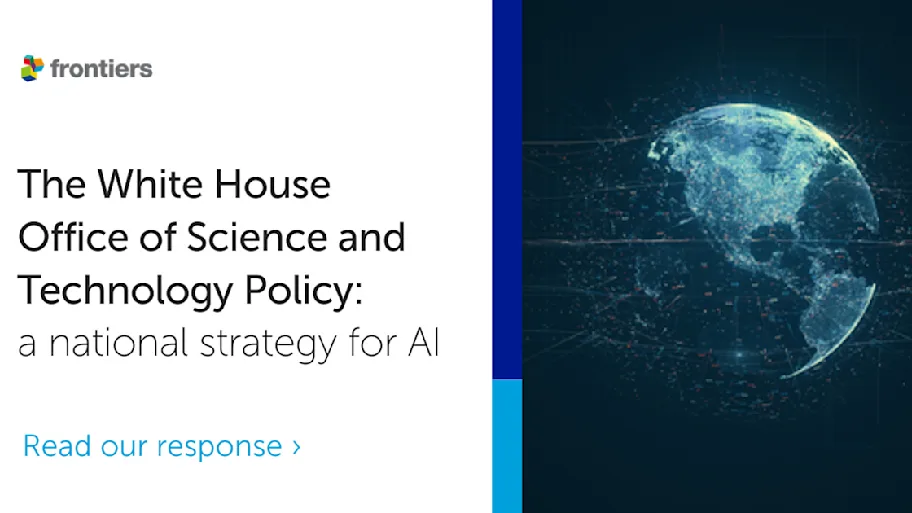
- Science News
- Featured news
- Frontiers responds to the US Copyright Office on artificial intelligence and copyright law
Frontiers responds to the US Copyright Office on artificial intelligence and copyright law
The United States Copyright Office has launched a call for information to shape its thinking on the policy implications of artificial intelligence (AI) systems, to help assess whether legislative or regulatory steps are warranted.

Headline response
Applying attribution to AI and Large Language Models (LLM) outputs is both ethically and commercially compelling.
We back attribution. The creative and intellectual contribution of our authors derives in large part from community collaboration. The effectiveness of that scientific collaboration is founded on attribution – and the ability to trace, test, cite, and develop the science.
The better the AI and LLM inputs – defined here as scientifically accurate, validated, verified, peer reviewed, and tested by public opinion – the better will be the outputs. We would encourage the U.S. Copyright Office to consider how scientific publishers might provide more inputs to train AI and LLMs.
Frontiers provides a publishing platform for such research that is immediately tested by public opinion.
We welcome the chance to respond to this important request for information from the United States Copyright Office (USCO). Frontiers is a leading research publisher and open science platform, the third most cited and sixth largest in the world. The science we publish is peer-reviewed, globally shared, and free to read.
Our mission is to make all science open – so that we can collaborate better and innovate faster, for fairer and more equitable outcomes in all parts of society. That is our social purpose as a business.
We are above all a knowledge, information, and technology company. We made the founding decision to build our own open science platform and we continually develop, improve, and customize it to meet the evolving needs of the scientific community.
And it is worth nothing that the articles we publish come under the CC-BY licence, allowing others to distribute, remix, adapt, and build on them, provided that attribution is given to their original creator. While it is standard practice for subscription paywall publishers to require that authors surrender their work’s copyright, all authors in all our journals retain all their rights, and copyright is not transferred to Frontiers.
This approach delivers truly open science that is freely and permanently available for anyone to view, download, and disseminate in interoperable, machine-readable formats, allowing all authors to commercially manage and exploit their intellectual property as they wish.
Our position is three-fold:
First, as a business whose driving purpose is to support the scientists who wish to publish their research with us, we back the principle of author attribution.
We think applying attribution to AI and LLM outputs – and doing so in a way that is easily accessible to both end user and rights holder – is both ethically and commercially compelling, notwithstanding that the cost and regulatory implications have yet to be fully understood.
The creative and intellectual contribution of our authors derives in large part from extensive community collaboration – backed in publication by a robust approach to editorial oversight, rigorous peer review, and immediate testing in the court of public opinion, all of which sharpen the quality and impact of new published knowledge.
The effectiveness of that scientific collaboration and publication is in turn founded on attribution – and the ability to trace, test, cite, and develop the science. A growing corpus of AI and LLM outputs that attributes authors will be key to scientific collaboration at scale. If we are to overcome existential threats, from health emergencies to climate change, global scientific collaboration will be essential to healthy lives on a healthy planet.
Second, it can easily be argued that the better the AI and LLM inputs – defined here as scientifically accurate, validated, verified, peer reviewed, and tested by public opinion – the better will be the outputs. We would encourage the USCO to consider how scientific publishers might provide more inputs to train AI and LLMs. Frontiers provides a publishing platform for such research that is immediately tested by public opinion. We do this with industry-leading editorial rigor, technology, and expertise, and a robust peer review underpinned by industry-wide ethical standards.
The Washington Post reported this year on the websites contributing most to Google's C4 data sets, which in turn "have been used to instruct some high-profile English-language AIs... including Google’s T5 and Facebook’s LLaMA." Frontiers is listed in the top 15 contributing websites but is joined by only one other open access publisher.
And third, in that context, we think the opportunity for better quality AI and LLM inputs is being squandered by a legacy scientific publishing system that locks scientific knowledge behind paywalls.
The global investment in research, which today approaches $3 trillion a year, generates, among other things, around four million peer reviewed papers each year that capture new knowledge. Most of that knowledge1 remains locked behind paywalls, slowing down the societal benefits of leveraging AI and LLM with higher quality inputs.
Within this framework, we fully support the August 2022 Office of Science and Technology Policy (OSTP) guidelines on immediate public access to federally funded research. We strongly welcomed them at the time, and the White House amplified that support.
We think it is possible to achieve the fullest possible access to our collective knowledge – for fairer outcomes in all parts of society – in a business model where AI and related technologies are cost-effective, commercially sustainable, and underpinned by private sector innovation. We stand ready to support the USCO and its partners in the federal government. It is vital we back responsible AI efforts for the good of open science and to meet the public appetite for accountability, transparency, and trust.
Read our full response here: Frontiers Response to Request for Information on Artificial Intelligence and Copyright
1 By published articles. Dimensions data for published articles 2022.




